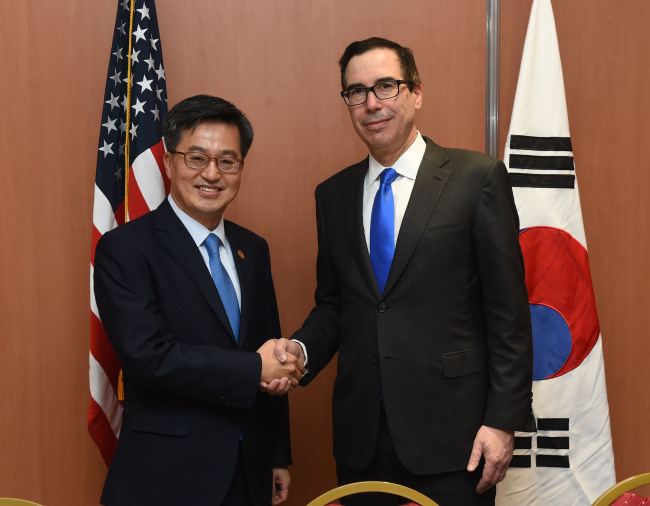Speculations rose Tuesday that South Korea may have to make compromises concerning its free trade deal renegotiation with the US, as it seeks to be exempted from the Trump administration’s new steel tariff.
The possibility escalated after Seoul’s top economic policymakers expressed optimism over the tariff exemption, with days remaining until the measure takes effect.
“I expect to have some good results within the week,” Minister of Trade, Industry and Energy Paik Un-gyu told reporters Monday.
A senior official of the presidential office Cheong Wa Dae also echoed such hopes.
“It is still too early to tell but the signal is that there is room for further negotiations, which is good for us,” the official said.
The hopeful remarks came as Seoul’s Deputy Prime Minister and Finance Minister Kim Dong-yeon met with US Treasury Secretary Steven Mnuchin in Buenos Aires, Argentina, on the sidelines of the Group of 20 meeting of finance ministers and central bank governors.
Kim said that the steel tariff could send a wrong signal over the Korea-US alliance at a time when the two countries should communicate closely over peninsula issues. He also underlined that South Korean steel products do not pose a threat to the US industry, citing their relatively low market share.
His counterpart said that he would see it to that Seoul’s stance be sufficiently reflected in Washington’s final policy decision.
The optimistic tone of the two economic chiefs kindled expectations that Korea, along with some other steel exporters, may make it off the tariff list despite the odds.
Their meeting was the last official high-profile occasion before the effectuation of US President Donald Trump’s latest plan to impose a 25 percent tariff on all steel imports and 10 percent on aluminum.
Pressured by the tariff plan, which local think tanks predicted may cause an economic impact of 7.23 trillion ($6.76 billion) over the next three years, Seoul sought for an exemption through multiple channels, but remained cautious over its next moves amid ongoing talks to amend the Korea-US Free Trade Agreement, as well as the upcoming inter-Korean summit and North Korea-US talks.
It was for such reasons that an improvement in the steel tariff issue led to increased worries concerning the FTA renegotiation, especially in the automobile industry, which Washington has been highlighting as the most problematic part of the bilateral deal.
“We will have to wait for the results,” an official of the presidential office Cheong Wa Dae told reporters Tuesday, refraining from further comment.
By Bae Hyun-jung ([email protected])


